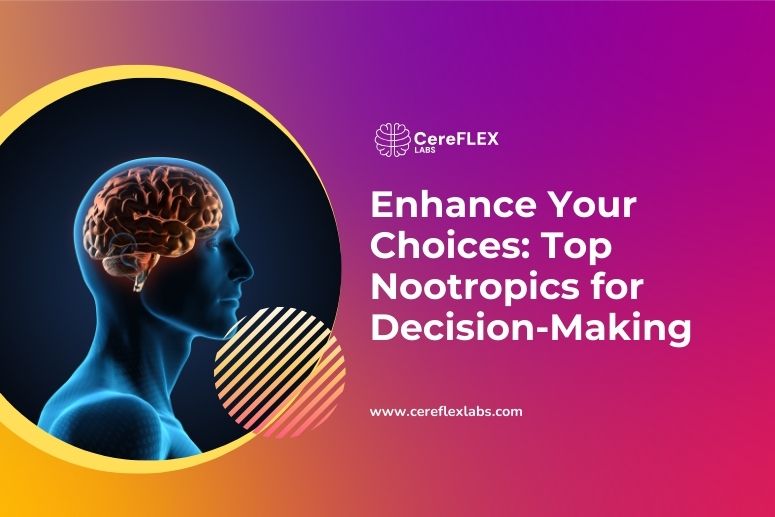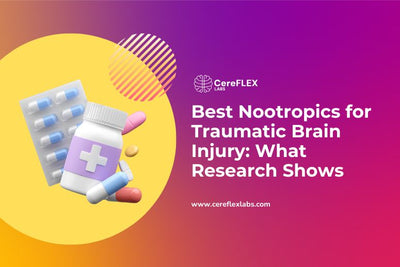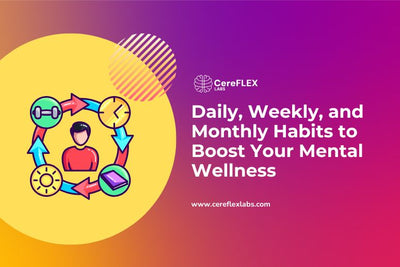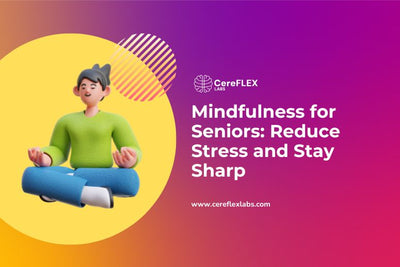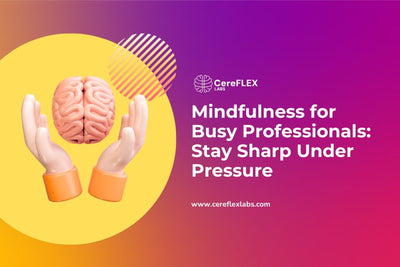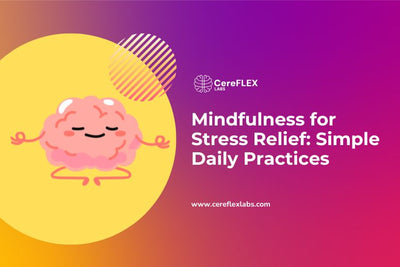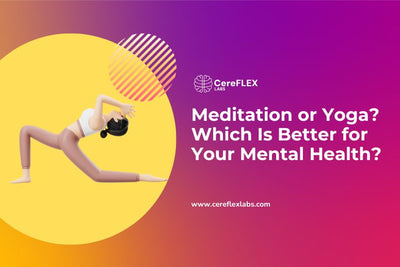Every day, we make countless decisions—some trivial, others that shape our careers or personal lives. Staying sharp under pressure calls for more than quick thinking. It demands long-term strategies for cognitive resilience.
That’s where nootropics come in.
Also known as "smart drugs," nootropics are natural or synthetic substances that support brain function. They may help you think more clearly, focus for longer, and make confident decisions—especially when it matters most. But not all nootropics are created equal. Some are better suited to improving decision-making than others.
In this guide, we’ll explore how the brain handles decisions, introduce the best nootropics for boosting your cognitive edge, and explain how to use them safely and effectively. Ready to sharpen your choices? Let’s get started.
What is Decision-Making & Why It Matters
Decision-making isn’t just about choosing between two options. It’s a complex mental process that draws on several core cognitive functions at once.
Whether you're weighing a business move, answering an exam question, or reacting in a high-pressure moment, your brain relies on three key systems:
Executive Function
Think of this as your brain's command centre. Executive function helps you plan, solve problems, control impulses, and adjust your thinking when situations change. It’s the system that weighs outcomes and supports flexible decision-making.
Working Memory
Working memory acts like a temporary mental notebook. It lets you hold and process information in real time—whether you're solving a math problem or keeping track of steps during a conversation.
Attention and Focus
These functions help you block out distractions and zero in on what matters most. Strong attention skills allow for faster, more accurate decision-making, especially under stress.
Tip: These mental systems are the foundation of good decisions. The right nootropics can sharpen your focus, boost processing speed, and help you stay confident under pressure.
What are the best nootropics for improving decision-making?
Certain nootropics can sharpen your focus, enhance memory, improve clarity, and build resilience to stress—key elements for making better decisions.
Below are five top supplements known to support smarter choices:

Caffeine
Caffeine is a well-studied nootropic known for boosting alertness, energy, and concentration. It's especially useful when you need to stay sharp—like during meetings, exams, or tight deadlines. It works by blocking adenosine, a neurotransmitter that signals fatigue, helping you stay awake and responsive.
Moderate doses between 40–300 mg have been shown to improve attention, vigilance, and physical endurance. That said, its effects on memory and decision quality can depend on your baseline sensitivity and dosage.1
The benefits of combining caffeine and L-Theanine are especially noteworthy. Together, they offer smoother energy, enhanced focus, and fewer side effects like jitteriness or anxiety—making this duo a powerful option for sustained cognitive performance.

L-Theanine
L-Theanine, an amino acid found in green tea, promotes calm focus without drowsiness. It helps ease stress and supports mental clarity during high-stakes moments.
In a Japanese study, adults aged 50 to 69 experienced improved attention and memory accuracy after a single dose. Continued use over 12 weeks delivered similar benefits. L-Theanine may support working memory, reaction speed, and overall focus.2

Bacopa Monnieri
A staple in Ayurvedic medicine, Bacopa monnieri helps with memory retention and speeds up mental processing. This can give you an edge when fast recall is key to making sound decisions.
In a six-week study of 60 medical students, those taking 150 mg twice daily showed noticeable improvement in cognitive test scores. The herb is believed to support learning and reduce cognitive fatigue.3

Rhodiola Rosea
Known as an adaptogen, Rhodiola rosea helps the body adapt to physical and mental stress without overstimulating the nervous system. It’s commonly used to increase focus, endurance, and mental clarity—especially in high-pressure or exhausting scenarios.
Its effects highlight the important link between stress management and cognitive performance. When your stress response is balanced, your brain is better equipped to process information and make reasoned choices, even in demanding environments.

Panax Ginseng
Panax Ginseng may reduce fatigue, improve memory, and enhance emotional balance. These effects make it a valuable supplement for professionals or students experiencing decision fatigue or mental overload.
Some studies show improved working memory just hours after taking it,4 with ongoing use linked to better mental resilience. It’s often included in nootropic routines designed to support mental stamina throughout the day.
How do these nootropics work?
The nootropics covered so far—Caffeine, L-Theanine, Bacopa Monnieri, Rhodiola Rosea, and Panax Ginseng—may seem different, but they all support decision-making by influencing how the brain processes information, manages stress, and maintains focus.
Here’s how they work:
Neurotransmitter Modulation
Nootropics help regulate brain chemicals that control focus, motivation, mood, and memory. For instance, dopamine supports goal-directed behaviour, while acetylcholine plays a major role in learning and recall. Some nootropics boost these neurotransmitters, while others slow their breakdown or enhance receptor sensitivity.
Enhancing Neuroplasticity
Certain nootropics promote neuroplasticity—the brain’s ability to form and strengthen neural connections. Bacopa monnieri, for example, may increase levels of brain-derived neurotrophic factor (BDNF), which supports learning and adaptation over time.
Improving Blood Flow and Oxygenation
Better blood circulation means more oxygen and nutrients reach brain cells. Nootropics like Rhodiola and Panax Ginseng have been linked to improved cerebral blood flow, which can enhance clarity, reaction time, and cognitive stamina during demanding tasks.
Boosting Brain Energy
The brain consumes a lot of energy, especially when under pressure. Some nootropics support mitochondrial function and ATP production, helping your brain stay energized and alert through long decision-making periods.
Reducing Inflammation and Oxidative Stress
Chronic inflammation and oxidative stress can impair memory, focus, and mental clarity—especially as we age. Some nootropics offer antioxidant and anti-inflammatory properties that help protect brain cells from long-term damage.
By targeting several of these pathways simultaneously through carefully chosen combinations, nootropic stacks for optimal brain function aim to deliver broader cognitive benefits—enhancing focus, mood, and decision-making more effectively than single supplements alone.
Are They Safe? Dosage and Side Effects
Most nootropics are considered safe for healthy adults when used within recommended dosages. However, every supplement affects individuals differently, and it’s important to understand potential side effects and risks—especially when combining products or using them long-term.
Here’s what to know about each of the key nootropics:
Caffeine
Common Dose: 50–260 mg per day
Upper Limit: Avoid exceeding 400 mg daily
Side Effects: High doses can cause insomnia, restlessness, anxiety, nausea, and a rapid heartbeat. Very large amounts may lead to irregular heart rhythms or, in rare cases, serious health issues.
Caffeine is generally safe in moderate amounts but may be unsafe at high or prolonged doses, particularly for those sensitive to stimulants.
L-Theanine
Typical Dose: 200–400 mg daily for up to 8 weeks
Side Effects: Mild and uncommon; may include headache or drowsiness. Long-term safety remains unclear due to limited studies.
L-Theanine is well tolerated and often used with caffeine to balance stimulation with calm focus.
Bacopa Monnieri
Suggested Dose: 300–600 mg daily for up to 12 weeks
Side Effects: Nausea, dry mouth, and stomach cramps are the most commonly reported issues.
When used at appropriate doses, Bacopa is likely safe and well supported by clinical research for short- to mid-term use.
Rhodiola Rosea
Recommended Dose: 100–600 mg daily for 6–12 weeks
Side Effects: May cause dizziness, dry mouth, or excess saliva. Some people may experience sleep disturbances if taken late in the day.
Rhodiola is typically safe when used within standard dosing timeframes.
Panax Ginseng
Effective Range: 200 mg to 3 grams daily, up to 12 weeks
Caution: Should not be used continuously for more than 6 months. Extended use may lead to hormone-like effects that could be harmful.
Side Effects: May include sleep issues, rash, or rare cases of liver damage or allergic reactions.
Tip: If you’re considering combining supplements, it’s important to understand the safe dosages of nootropic supplements. When in doubt, speak to a healthcare provider—especially if you’re on medication or have pre-existing conditions.
Conclusion
Nootropics can offer real benefits for improving focus, memory, mental clarity, and resilience under pressure—skills that are essential for better decision-making.
Whether you’re a professional navigating high-stakes situations, a student preparing for exams, or simply someone looking to stay mentally sharp, the right supplement routine can support your cognitive goals.
To get the best results, choose nootropics that match your specific needs, understand how they work, and stick to safe dosage ranges. Consistency and mindfulness are key—not just for performance, but also for your long-term brain health.
Try a Simple Routine That Works All Day
For an easy, balanced approach, CereFlex Labs offers the AM/PM Protocol—a dual system designed to support your brain from morning to night.
The Brain Morning Formula supports focus and mental clarity with ingredients like Asian ginseng and L-tyrosine, while the Cognitive Support Evening Formula includes Ginkgo biloba and phosphatidylserine to aid memory and support healthy circulation.
Together, they provide natural cognitive enhancers in one convenient routine.
Ready to sharpen your thinking and take control of your choices? Start small—and build better decisions, one step at a time.
